
The Organization of American States is an international organization founded on 30 April 1948 to promote cooperation among its member states within the Americas.

The National Assembly is the federal legislature of the Bolivarian Republic of Venezuela, which was first elected in 2000 under the 1999 constitution. It is a unicameral body made up of a variable number of members, who are elected by a "universal, direct, personal, and secret" vote partly by direct election in state-based voting districts, and partly on a state-based party-list proportional representation system.

Elections in Venezuela are held at a national level for the President of Venezuela as head of state and head of government, and for a unicameral legislature. The President of Venezuela is elected for a six-year term by direct election plurality voting, and is eligible for re-election. The National Assembly (Asamblea Nacional) has 277 members (diputados), elected for five-year terms using a mixed-member majoritarian representation system. Elections also take place at state level and local level.

United States–Venezuela relations have traditionally been characterized by an important trade and investment relationship as well as cooperation in combating the production and transit of illegal drugs.
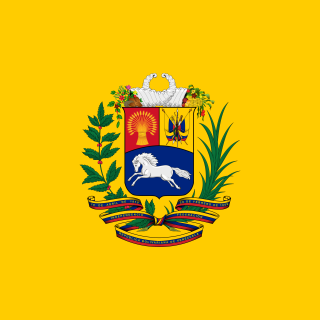
The president of Venezuela, officially known as the president of the Bolivarian Republic of Venezuela, is the head of state and head of government in Venezuela. The president leads the National Executive of the Venezuelan government and is the commander-in-chief of the National Bolivarian Armed Forces. Presidential terms were set at six years with the adoption of the 1999 Constitution of Venezuela, and presidential term limits were removed in 2009.

Iris Xiomara Castro Sarmiento, also known as Xiomara Castro de Zelaya, is a Honduran politician who has served as the 39th president of Honduras since January 2022. She is the country's first female president, and served as first lady during the presidency of her husband Manuel Zelaya.
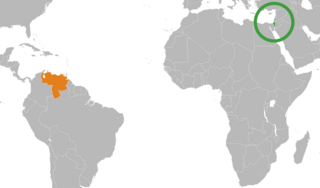
Israeli–Venezuelan relations refer to foreign relations between Israel and Venezuela. Both countries have no formal relations since 2009. Canada serves as Israel's protecting power in Venezuela through its embassy in Caracas, while Spain serves as Venezuela's protecting power in Israel through its embassy in Tel Aviv.
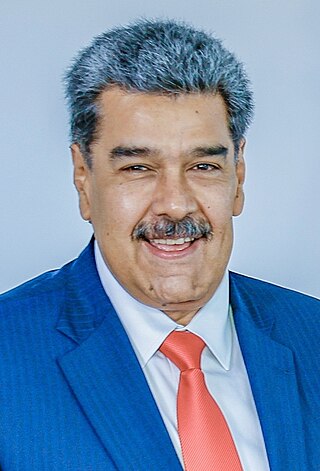
Nicolás Maduro Moros is a Venezuelan politician serving as the 53rd president of Venezuela since 2013. Previously, he was the 24th vice president of Venezuela from 2012 to 2013, the minister of foreign affairs from 2006 to 2012, and the 3rd president of the National Assembly of Venezuela from 2005 to 2006.

Under the rule of President Hugo Chávez who was elected President of Venezuela in 1998, relations between Israel and Venezuela rapidly deteriorated as Venezuela strongly supported the rights of the Palestinians and condemned Israeli actions, twice expelling the Israeli ambassador from Venezuela. Venezuela officially recognized the State of Palestine and established diplomatic relations with the Palestinian Authority on 27 April 2009.

33 independent nations of the Americas are member states of the Organization of American States (OAS); Cuba and Nicaragua are the only exceptions, although they were both formerly member states.

Julián Isaías Rodríguez Díaz is a Venezuelan politician, diplomat and lawyer. He was appointed the vice president of Venezuela on 29 January 2000 by Hugo Chávez, and served in the post until 26 December 2000.

On 29 March 2017, the Supreme Tribunal of Justice (TSJ) of Venezuela took over legislative powers of the National Assembly. The Tribunal, mainly supporters of President Nicolás Maduro, also restricted the immunity granted to the Assembly's members, who mostly belonged to the opposition.

Constituent Assembly elections were held in Venezuela on 30 July 2017 to elect the members of the 2017 Constituent National Assembly. Unlike the 1999 Constituent National Assembly, which was assembled following a referendum, the 2017 election was convened by the presidential decree of President Nicolás Maduro. Smartmatic, the company which provided the voting machines, stated that the results were tampered with by the CNE, and that the turnout was off by at least one million votes.
Samuel Reinaldo Moncada Acosta is a Venezuelan politician and diplomat currently serving as Permanent Representative of Venezuela to the United Nations since 2017 and formerly served as Alternate Representative of Venezuela to the Organization of American States from 2017 to 2019. He was Venezuela's deputy foreign minister until June 2017, when he succeeded Delcy Rodriguez as Venezuela's Foreign Minister. On August 2, 2017, following the 2017 Venezuelan Constituent Assembly election, President Nicolás Maduro appointed former Vice President Jorge Arreaza to replace Moncada as the new Foreign Affairs Minister.

Freddy Guevara is a Venezuelan politician. He was elected deputy to the Venezuelan National Assembly for Circuit 2 of the Miranda State representing the Democratic Unity Roundtable in the parliamentary elections of December 6, 2015. He has been a key figure of the opposition to Nicolás Maduro, Guevara was arrested in July 2021 charged with crimes against the state. The United States and others condemned the arrest as politically-motivated. In mid-August, he was freed as part of negotiations between the Maduro government and the Venezuelan opposition.
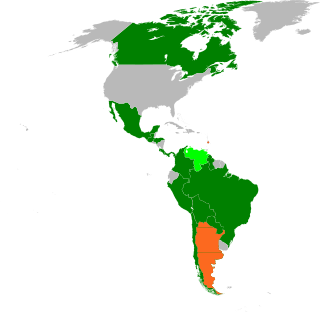
The Lima Group is a multilateral body that was established following the Lima Declaration on 8 August 2017 in the Peruvian capital of Lima, where representatives of 12 countries met in order to establish a peaceful exit to the ongoing crisis in Venezuela.

Juan Gerardo Antonio Guaidó Márquez is a Venezuelan opposition politician. He belonged to the social-democratic party Popular Will, and was a federal deputy to the National Assembly representing the state of Vargas.
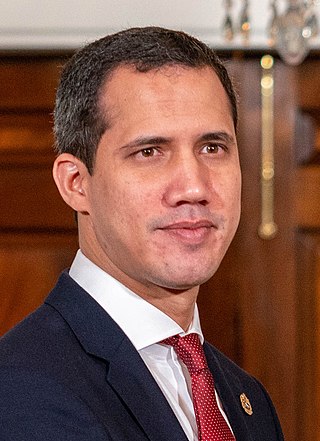
The Venezuelan presidential crisis was a political crisis concerning the leadership and the legitimate president of Venezuela between 2019 and 2023, with the nation and the world divided in support for Nicolás Maduro or Juan Guaidó.

Gustavo Tarre Briceño is a Venezuelan politician, lawyer, author, professor of constitutional law and politic science, and representative to the Organization of American States (OAS).
Isabel Brilhante Pedrosa is a Portuguese diplomat who served as the European Union Ambassador to Venezuela. She became the ambassador in February 2018 and she was asked to leave in the following year.


















